
D.A. Davidson analyst Gil Luria is calling for a full-scale breakup of Alphabet Inc., urging the company behind Google to unlock shareholder value by dismantling its tech empire — a conglomerate that now faces intensifying antitrust scrutiny and growing competitive pressure from AI-driven rivals like OpenAI.
In a report published Monday, Luria said investors “want a big-bang breakup, not isolated spinoffs,” arguing that Alphabet’s current structure masks the true value of its high-growth businesses like YouTube, Google Cloud, and Waymo, which he claims are being dragged down by management’s obsession with controlling the entire stack.
“We realize that a breakup would cause dis-synergies and that management is trying to maximize profit at the Alphabet level,” Luria wrote, “but investors are much more interested in total shareholder value, not short-term profits.”
Register for Tekedia Mini-MBA edition 19 (Feb 9 – May 2, 2026).
Register for Tekedia AI in Business Masterclass.
Join Tekedia Capital Syndicate and co-invest in great global startups.
Register for Tekedia AI Lab.
The breakup call helped buoy Google stock, which rose amid broader market optimism sparked by improved U.S.-China trade sentiment.
In Support of Two Major DOJ Lawsuits
Luria’s remarks come at a time when Alphabet is facing two antitrust lawsuits from the U.S. Department of Justice — one targeting its dominance in internet search, and the other its stronghold over the digital advertising market.
These legal battles have already resulted in two major legal rulings:
- In April 2024, Judge Leonie Brinkema ruled that Alphabet had engaged in classic monopoly-building tactics in digital advertising.
- Earlier, Judge Amit Mehta ruled that Google had illegally maintained a monopoly over online search, primarily by paying Apple billions of dollars annually to be the default search engine on its devices — a move that crushed competition before it could emerge.
Both rulings are expected to inform the remedies the DOJ will push for. In particular, regulators have floated the possibility of forcing Google to divest key assets, including its Chrome browser, and possibly parts of its ad tech business — a central pillar of Alphabet’s revenue machine.
Luria believes Alphabet’s leadership will resist by making “passive aggressive spinoffs”, such as separating its ad network or Chrome/Android divisions, but only after dragging its feet to buy time.
Strong Businesses Undervalued
Despite Alphabet’s steady cash flows, Luria argues the market is punishing the company’s bloated structure, valuing it at just 16 times earnings — a multiple he says implies:
- Zero value for Waymo, Alphabet’s autonomous vehicle unit, and
- Severe undervaluation of YouTube, Google Cloud, and the ad network.
Analysts have long contended that YouTube, if spun off, could be worth hundreds of billions on its own. Similarly, Google Cloud, which is growing but still not profitable, may attract more focused investor interest if freed from Alphabet’s umbrella.
The OpenAI Threat
Beyond antitrust battles, Alphabet’s crown jewel, Google Search, faces existential risk from OpenAI’s ChatGPT and similar AI-driven search alternatives. These new platforms bypass the traditional search-and-click model, directly answering queries instead of listing links.
While Google has responded by launching AI Overviews, a system that integrates its Gemini AI model into search results, the shift hasn’t gone unnoticed by advertisers or investors. The move may signal Google’s pivot from web-link ad revenue to answer-based monetization, but its real-world impact remains uncertain.
“Search ad revenue growth could persist well past the point the business is damaged,” Luria noted. “Only after Apple switches defaults and ChatGPT turns on ads will we see the real impact. That may take several quarters.”
This underscores a looming overhang: while Google’s search business remains profitable now, its core model is eroding, and the shift to AI could destabilize ad revenue faster than Alphabet can adapt.
Echoes of Past Breakups
The call to dismantle Alphabet is reminiscent of investor campaigns to break up other tech giants, most notably Meta Platforms and Amazon, where many have argued that sprawling empires depressed the value of otherwise high-performing assets.
In Alphabet’s case, investors have grown impatient with a corporate structure that prioritizes internal control and moonshot investments over market discipline and shareholder returns.
The D.A. Davidson report represents one of the clearest signals yet that investors are no longer content to wait, especially as legal pressure builds and AI disruption threatens Google’s monopoly profits.
If Alphabet refuses to act on its own, it may not have much of a choice for long. With two federal rulings already on the books, the DOJ is preparing remedies, and divestiture orders may not be far off. Luria suggests Alphabet’s best bet may be to preemptively break itself apart on its own terms, before regulators dictate the process.



